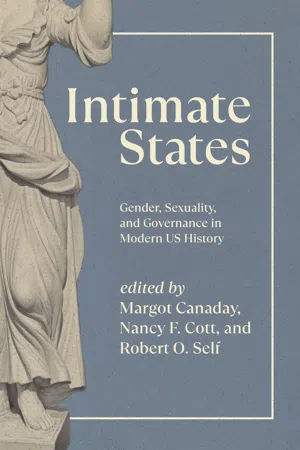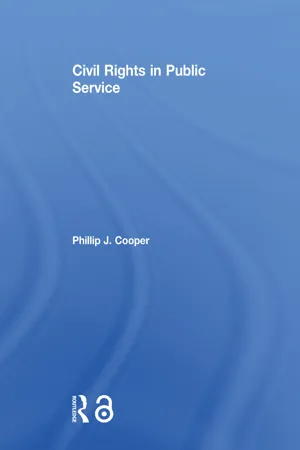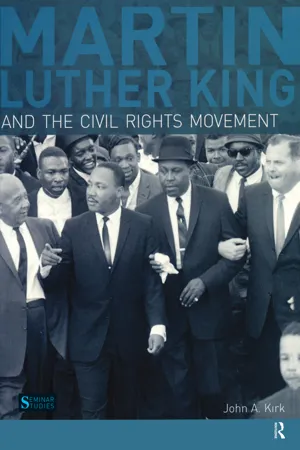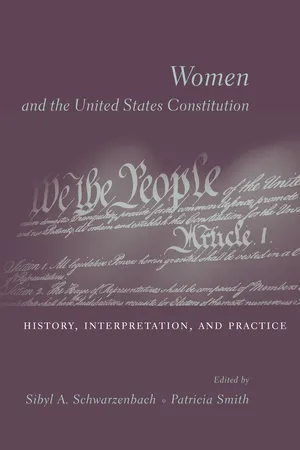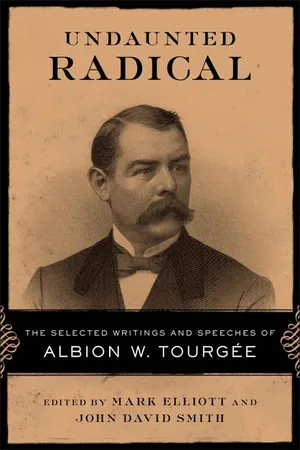History
Thirteenth Amendment
The Thirteenth Amendment to the United States Constitution, ratified in 1865, abolished slavery and involuntary servitude, except as punishment for a crime. It was a landmark moment in American history, marking the end of legal slavery and laying the foundation for the civil rights movement. The amendment was a crucial step towards ensuring freedom and equality for all citizens.
Written by Perlego with AI-assistance
Related key terms
5 Key excerpts on "Thirteenth Amendment"
- eBook - ePub
Intimate States
Gender, Sexuality, and Governance in Modern US History
- Margot Canaday, Nancy F. Cott, Robert O. Self, Margot Canaday, Nancy F. Cott, Robert O. Self(Authors)
- 2021(Publication Date)
- University of Chicago Press(Publisher)
5 One key goal of this essay is to show how centuries of sexual violence against slave women, and the children born as a result, set a deep explosive charge under every negotiation over the terms of freedom in the postwar South.The Thirteenth Amendment: Passage and Ratification
Passage of the Thirteenth Amendment was a crucial achievement of the Lincoln administration and a measure of state authority so untrammeled that it can be said to have remade the United States.6 The total, immediate, and uncompensated abolition of slavery was codified in the amendment and imposed on the rebel states as a condition of readmission to the Union. It was “one of the largest liquidations of private property in world history,” fully two-thirds of the capital wealth of the Southern states.7 A measure entirely unthinkable in 1860, it was achieved (in part) in 1863 only as an executive order issued as a war measure.8 Revising the US Constitution by amendment thus was essential. The amendment and its implementation stand at the very center of arguments about the Civil War as the “birth of the modern American state.”9 Enforcement in the defeated Confederate states represented an assertion of central state authority in the affairs of the separate states inconceivable in the first republic.Even in the Republican-controlled 38th Congress, passage of the amendment was not an easy proposition. It passed in the House of Representatives on January 31, 1865, on an almost party-line vote of 119 to 56, a stripped-down but revolutionary measure ending the national government’s recognition of legitimate property in human beings.10 The amendment was quickly ratified by numerous Northern states and small Unionist governments of occupied Confederate states, but Union border states remained opposed. The Kentucky legislature declined to ratify even on condition of compensation and a strictly limited set of civil rights for newly freed slaves; tellingly, the one new right the state was willing to grant was recognition of marriages and parental relationships.11 In mid-April 1865 when Grant accepted Lee’s surrender, the amendment remained short of the votes needed for ratification. Its fate thus fell into the hands of the defeated Confederate states, and their defiant posture did not bode well. President Johnson urged provisional governors to ratify as the basis of a lenient reconstruction and readmission.12 - eBook - ePub
- Phillip J. Cooper(Author)
- 2016(Publication Date)
- Routledge(Publisher)
… In respect of civil rights, common to all citizens, the Constitution of the United States does not, I think, permit any public authority to know the race of those entitled to be protected in the enjoyment of such rights.… I deny that any legislative body or judicial tribunal may have regard to the race of citizens when the civil rights of those citizens are involved. Indeed, such legislation, as that here in question, is inconsistent not only with that equality of rights which pertains to citizenship, National and State, but with the personal liberty enjoyed by every one within the United States.The Thirteenth Amendment does not permit the withholding or the deprivation of any right necessarily inhering in freedom. It not only struck down the institution of slavery as previously existing in the United States, but it prevents the imposition of any burdens or disabilities that constitute badges of slavery or servitude. It decreed universal civil freedom in this country.… [It] was followed by the Fourteenth Amendment, which added greatly to the dignity and glory of American citizenship, and to the security of personal liberty…. These two amendments, if enforced according to their true intent and meaning, will protect all the civil rights that pertain to freedom and citizenship. Finally, … it was declared by the Fifteenth Amendment that “the right of citizens of the United States to vote shall not be denied or abridged by the United States or by any State on account of race, color or previous condition of servitude.”These notable additions to the fundamental law were welcomed by the friends of liberty throughout the world. They removed the race line from our governmental systems. They had, as this court has said, a common purpose, namely, to secure “to a race recently emancipated, a race that through many generations have been held in slavery, all the civil rights that the superior race enjoy.” They declared, in legal effect, this court has further said, “that the law in the States shall be the same for the black as for the white; that all persons, whether colored or white, shall stand equal before the laws of the States, and, in regard to the colored race, for whose protection the amendment was primarily designed, that no discrimination shall be made against them by law because of their color.”… - John A. Kirk(Author)
- 2014(Publication Date)
- Routledge(Publisher)
Part 6 DocumentsDocument 1Thirteenth Amendment to the US Constitution, 1865The Thirteenth Amendment abolished slavery, the first step for black Americans on the road to freedom and equality.Section 1. Neither slavery nor involuntary servitude, except as a punishment for crime whereof the party shall have been duly convicted, shall exist within the United States, or any place subject to their jurisdiction.Document 2Fourteenth Amendment to the US Constitution, 1868The Fourteenth Amendment defined what it meant to be a citizen of the US-‘bom or naturalized’ – and promised equal protection of the laws to all citizens.Section 1. All persons bom or naturalized in the United States and subject to the jurisdiction thereof, are citizens of the United States and of the State wherein they reside. No State shall make or enforce any law which shall abridge the privileges or immunities of citizens of the United States; nor shall any State deprive any person of life, liberty, or property, without due process of law; nor deny to any person within its jurisdiction the equal protection of the laws.Document 3Fifteenth Amendment to the US Constitution, 1870The Fifteenth Amendment promised voting rights to all male citizens Women did not get the vote until the adoption of the Nineteenth Amendment in 1920.Section 1. The right of citizens of the United States to vote shall not be denied or abridged by the United States or by any State on account of race, color, or previous condition of servitude.Document 4Brown v. Board of Education, 17 May 1954MR. CHIEF JUSTICE WARREN delivered the opinion of the Court…The Brown decision outlawed segregation in schools and undermined the notion of‘separate but equaV. In reversing its earlier decision, the Court pointed to the changed context of education in American society since Plessy and to new psychological evidence about the impact of segregation on schoolchildren.- eBook - ePub
Women and the U.S. Constitution
History, Interpretation, and Practice
- Sibyl Schwarzenbach, Patricia Smith(Authors)
- 2004(Publication Date)
- Columbia University Press(Publisher)
63Reclaiming the Promise of the Thirteenth AmendmentThe retention of the interpretation of the Thirteenth Amendment that it abolished the badges and indicia of slavery is the good news for those who support public policy initiatives for reparations64 or seek to litigate issues of presentday rights to reparations pursuant to the Thirteenth Amendment. Although the courts have been reticent to give this interpretation its full and rightful meaning, as I have already described, retention keeps the door open for advocates of the broader meaning of the amendment’s protections. Indeed, the history of the reparations movement is a history of African peoples and their allies seeking, implicitly and explicitly, to make real the promise of the Thirteenth Amendment.The U.S. Reparations Movement’s Demands are for the Fulfillment of the PromiseThe proponents of the Thirteenth Amendment and the Civil Rights Act of 1866, urged that the freed Africans have equality before the law. Justice Harlan’s statement in Plessy, that indeed whites were superior,65 had some basis in the material reality that African descendants had little material wealth as compared to whites at that time. The congressional proponents of the Thirteenth Amendment and the subsequent supporters of equal legal rights such as Justice Harlan, with a few exceptions, failed to acknowledge that this inequality was itself a vestige of slavery that required a remedy.Even rough equality in material resources requires some affirmative response to the stolen labor of African peoples that left most African peoples without financial resources when slavery was abolished. This need was discussed by some senators in the debates over the Thirteenth Amendment66 and addressed woefully inadequately in the Freedmen’s Bureau Act for those who were “destitute.” In the 1890s, some twenty-five years after the failure of the Freedmen’s Bureau Act to provide material reparations for the newly freed African, the Ex-Slave Mutual Relief, Bounty & Pension Association was founded. One of its primary leaders was an African woman, Mrs. Callie House. The purpose of this organization was to obtain pensions for those formerly held as slaves, their surviving spouses, or their descendants. One of the bills that this association supported was Senate Bill 4718, which was introduced on June 6, 1898. Mrs. House, national promoter, and Rev. Isaiah Dickerson, general manager, along with others, organized hundreds of thousands of African descendants to support this and other initiatives.67 - eBook - ePub
Undaunted Radical
The Selected Writings and Speeches of Albion W. Tourgée
- Mark Elliott, John David Smith(Authors)
- 2010(Publication Date)
- LSU Press(Publisher)
The bondage of the Israelites in Egypt is a familiar instance of this. It was unquestionably “Slavery,” but it was not chattelism. No single Egyptian owned any single Israelite. The political community of Egypt simply denied them the common rights of men. It did not go as far as American Slavery in this respect since it did not by law deprive them of all natural and personal rights. It left the family and unlike our Christian slavery did not condemn a whole race to illegitimacy and adultery. It was this subjection to the control of the dominant race individually and collectively, which was the especially distinctive feature of slavery as contra-distinguished from involuntary servitude. The slave was one who had no rights—one who differed from the citizen in that he had no civil or political rights and from the “free person of color” in that he had no personal rights. The object of the XIIIth Amendment was to abolish this discrepancy of right, not only so far as the legal form of chattelism was concerned, but so far as civil rights and all that regulation of relation between individuals of specific race and descent which marked the slave’s attitude to the dominant race both individually and collectively was concerned. There were in all the slave states specific codes of law intended for the regulation and control of the slave-class. They marked and defined not only his relation to his master but to the white race. He was required to conduct himself, not only “respectfully,” which term had a very different signification when applied to the slave than when applied to the white man, but was expected and required to demean himself “submissively” to them. His position was that of legal subjection and statutory inferiority to the dominant race. It was this condition and all its incidents which the Amendment was intended to eradicate. It meant to restore to him the rights of person and prop-erty—the natural rights of man—of which he had been deprived by slavery
Learn about this page
Index pages curate the most relevant extracts from our library of academic textbooks. They’ve been created using an in-house natural language model (NLM), each adding context and meaning to key research topics.
